VOXUS: Working With The Human Voice with Davin Youngs
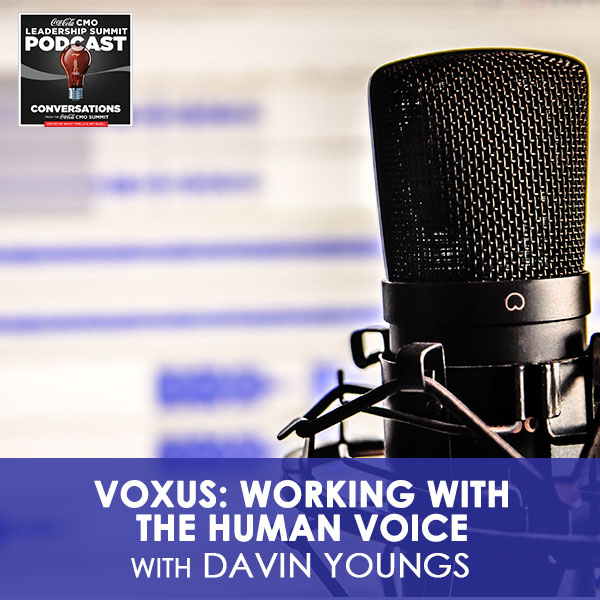
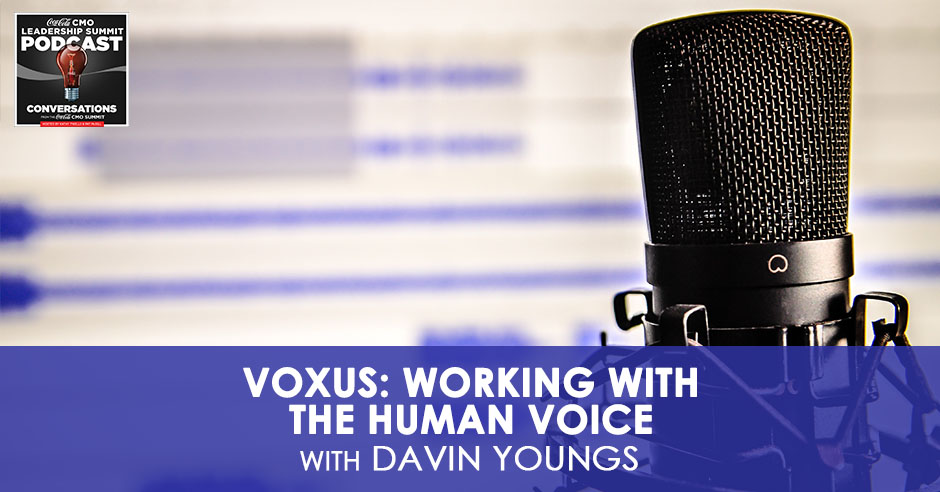
For most of us, we live our lives through calendars, planned structures and meetings that we sometimes get burned out or reach a plateau. For Davin Youngs, CEO and Facilitator at VOXUS, tapping into a force that is both creative and unpredictable can steer you back into motivation, improvisation, and growth, and that is our human voice. The VOXUS team brings years of experience coaching and working with the human voice through singing. They bring people into this experience through singing where they end up having a lot of fun and walking away changed. Davin shares there is a vocal story that we have and experiences we can draw from through singing, because more than ever, you find people seeking experiences that remind them of what it is to be human again.
Listen to the podcast here:
VOXUS: Working With The Human Voice with Davin Youngs
Davin Youngs, welcome to our podcast.
Kathy, glad to be here.
Before we dig in, I have to have to start out with this story of how I came to know you. I’m randomly driving from Portland to Seattle a few years ago and listening to podcasts, looking for anything that might entertain my drive. I come upon The RobCast, and on the whole it’s an interview with you. I was so mesmerized by what you were saying and how you were saying it. I remember thinking at that moment, “This is someone that I need to know. I need to know who this person is and what they’re doing in this world. Maybe we could bring him to the CMO Summit.” The rest is history because you are now a distinguished alum of the CMO Summit. We were so happy. I’m so happy to have you with us. It took some doing for me to muster up the courage to have you come there and do what you do, which is magical. With that background, what I’d like to do for people who were not at the Summit, who don’t know anything about what you do, give us the origin story of Davin and what you do and how this all came to be.
You met me through my company called VOXUS, which is best described in corporate terms as a corporate team building activity. I like to think of it more as a life changing opportunity that utilizes improvised singing to bring groups together quickly, efficiently, and with tremendous vulnerability and fun, seemingly a lot of risk and really not much risk. A lot of people have a lot of fear around singing so it can seem a big deal. The truth of the matter is rarely does someone get hurt doing it. We’re able to bring people into this experience quickly through singing. They end up having a lot of fun and walking away changed.

VOXUS: A lot of people have a lot of fear around singing so it can seem a big deal.
The origin of that is I’m a singer, first and foremost. I’m a teacher in singing and I’ve spent a lot of years working individually with people working on their voice. I’m specifically thinking about the function of their voice, the physical function, what does it mean to use our voices with more freedom and with more flexibility. Meanwhile, I was doing that with my own instrument. After a lot of years of rigorous work with a specific teacher, I decided I would go to a workshop at a place called the Omega Institute, which is in Rhinebeck, New York. The workshop is called Circlesongs and it’s with a guy named Bobby McFerrin who many probably know from Don’t Worry, Be Happy. That’s his claim to fame. His skill and his artistry is rich, deep and long. One of his primary skills is that he’s a tremendous improviser with his voice. For years he did concerts just with his voice. It would be the entire orchestra.
In the ‘80s and ‘90s, he had a group called the Voicestra, which was an acapella group that he created. They used improvisation as a form to do concerts. That group spawned an album and spawned this workshop that happens at Rhinebeck called Circlesongs, which is a Bobby McFerrin album, which are these tools of improvisation. I went to that workshop, I left and I thought, “I can get just about anyone to do this.” I had previously been doing some private voice instruction at Google here in Chicago. I remember leaving the Google experience thinking something wasn’t quite right. I remember thinking, “I’m not getting the people into the quite the experience that I want to get them into.” I thought after leaving Omega that improvisation was where I wanted to take people because it was a quicker way in. It was a little less self-reflective, because self-reflection can kill an idea.
That was the origin of VOXUS. I specifically had been working with some corporate groups. I thought, “What if I utilize these models, these games, and these exercises in a corporate setting?” That spawned VOXUS and ever since, I’ve been working with corporate groups and all types of groups, Chicago public schools teachers, the Presbyterian Church denomination, real estate accountants.
Speaking of the toughest crowds and getting anyone to possibly do it, I did it at the CMO Summit with you last year. All the things that you described took place. You felt vulnerable, you felt like, “What’s happening? I can’t do this,” and then on the other side of it definitely felt a different change. You see that every time you go out with VOXUS and do what you do. What to you has been the biggest swing in terms of what you anticipated going in with a group and what you saw coming out?
Using your voice comes from such a human, visceral, and natural space that people are familiar with.
I always try to express to people that I’m as scared as they are. The vulnerability doesn’t go away. I’ve learned to live in that space. I’m more comfortable in that space than you are, but the feeling is just as unreal. When you walk into specifically a hotel ballroom with no acoustics and a bunch of people in shirts and ties staring at you and you start to sing at them, it’s a terrifying scenario. I will say that that the evil part of me loves that discomfort for you all too because I also have done it enough that I know. Even the worst groups I’ve had have all walked away laughing, dancing, and singing. People always ask me, “What if they won’t sing?” I haven’t had that experience. That is because singing is such a human experience that regardless of whether you feel comfortable or not doing it, using your voice comes from such a human, visceral, and natural space that people are familiar with whether they’re uncomfortable doing it or not. They can find their way into it quite quickly.
What’s interesting about improvisation, whether it’s the comedy you were talking with Kelly earlier about how to do that in an improvisational setting and singing, the fact that we’re inventing on the spot, there’s some creative force that that taps into that. All the planned structure that we live our lives in, our calendars, the way this meeting’s going to go, when you go into the space of creation, there’s some magic about it. You can’t predict what’s going to happen. That’s what makes it amazing.
You can’t predict what it is that you will create. You can steer the outcomes though. When we think of improvisation, we think, “I’m going to make it up.” That is such a lie that our ego tells us because we’re constantly drawing on human experience. For instance, most of us have sung in the shower or in the car. There is a vocal story that we have. As a child, in church, at a funeral or a wedding, there are a lot of times when we used our voices. When I go into those spaces, I know that people are able and willing to draw from those experiences. We may be fearful, but we’re not making it up. We’re pulling from this database, this bank of information, these stories that we’ve carried for many years. If you have a good facilitator and you have some good exercises, it’s quite easy to find your way into it, but the idea that immediately evokes with people is, “I’m not good enough. I can’t do that. I don’t think I’ll be able to make it up. I’m not good on the spot.”
In the world that we live in today, everything from connection to art can be created via technology. The most human of all the arts is singing because you’re using your body to do it. Where do you see that plane in the connectivity of the community, both human but also within the business folks that you work with?
To participate in singing is a full body experience.
If you look back in historical literature and ancient philosophy, you’ll always find singing as the elevated art form that sits above the rest. That doesn’t discount or diminish other art forms. Dancing is close, but the piece about that is that you can’t half do it. To participate in singing is a full body experience. It’s an embodied experience. What makes it different than talking is the extension of it. Right now I’m stuttering, my breath is short. There’s something diminished about that, but when I sing I have to fully move into the sound, if I do sing. When we find ourselves in that position to do that, it brings us to that which feels most real and most human. In light of these technology pieces that you’re talking about, which by the way I love technology and I’m excited about improvisation with technology too, you find more than ever people seeking these experiences that remind them of what it is to be human.
Yoga has never been more popular in the United Sates, and you find these embodied experiences from dance to singing to climbing. People are climbing a lot. We want these opportunities to feel like we have to put our phones down, we have to use our whole body, and it’s probably going to cause us to focus with our brains as well. When we are reminded of our own humanity in those moments, we tend to forget that which disconnects us or that which divides us. For the business community, what I find most exciting is that when I bring people into that space together, they somehow forget their roles.
I have a funny story about a guy that I did a job in San Francisco. I didn’t know who the CEO of the company was because the person who hired me was like the VP or something. There was this one gentleman who was so into it all. We were in a circle and I was like, “This guy is loving it.” I called him in the middle. I don’t remember his name, let’s say it’s Jim. I was like, “Does everyone know who Jim is?” I didn’t know the whole time, but I was thinking how funny it was. It didn’t matter. This guy ran this huge Fortune 500 company. It didn’t matter because he just loved being there with those other human beings and they got to see a side of him that I guarantee they have not seen before. It’s also different than what we do if you go to a bar, drink, and sing, because this is about engaging with each other. It’s not a passive activity.
One of the goals of the CMO Summit, it’s a lofty goal but we want to create an experience that is somewhat transcendent. We go to conferences and meetings all the time and you sit there and receive. When you are not having some visceral experience, sometimes you don’t retain the information. Why do you think a business needs this? I sometimes wonder as we go about our daily jobs and we’re head down and focused on the task list, where does that sense of bigger purpose and meaning come into our day? How does this aid our awareness of something bigger than ourselves?
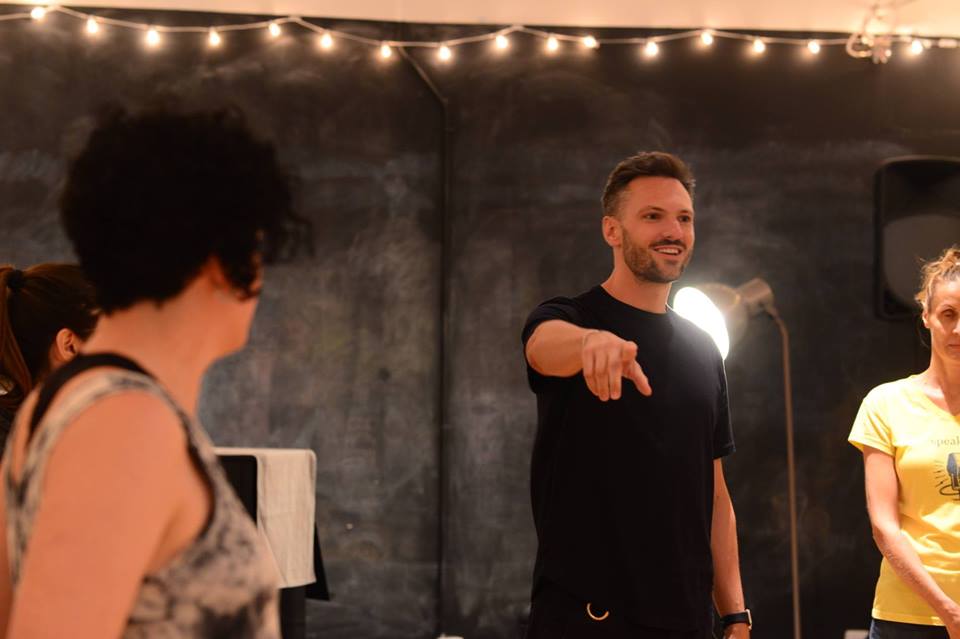
VOXUS: You can’t speak to experience unless you have the experience.
I have a couple of answers for this and I’ll tell you the one that everyone wants me to say. It’s, “What’s the return on this investment?” That’s the question I get all the time. Why does it matter? Why do we do it? My honest to god answer is because you do it. To be there and do it is a value in and of itself, and to be there with the other people in the room is the value. I don’t need to prove it anywhere beyond that. They know that from the experience I’ve had and the people that have participated know it from the experience they have. You can’t speak to experience unless you have the experience. You can try. That piece for me, the value is in the act and the natural inclination it has to draw people together.
There’s only one way we can learn how to do it and it’s to do it, to have the experience.
You remember from the summit, I share a lot of specific science. There’s a lot of science, but singing’s secondary. It’s the way of whetting people’s whistle and letting them know that I’m for real about this. The other piece too is that you keep hearing people talk about this word. This is the buzz word; you all know it, disruption, disruptive, disrupt. This is everywhere. I laugh every time I hear it because people don’t really want disruption. Disruption is uncomfortable. Disruption sucks. Let’s be honest. We hear these buzz words. Vulnerability was another one where you’re still hearing for a time. You hear this in the business community or leaders bringing up this word. All the people are bringing it up with good intention, but to sit in that space of discomfort, to sit in the awkwardness of change, to sit in that in-between, most of us don’t want that. There’s only one way we can learn how to do it and it’s to do it, to have the experience.
If you want your employees to be comfortable with change, if you want the people you work with to be able to grow, to become better, and not to keep doing the same thing and fall down the same patterns, you have to put them in places where they’re uncomfortable. You have to disrupt the series of events they’re used to going through. You can’t go into another hotel ballroom with another set of talking heads and expect to have an impactful outcome. That’s why I laugh when I see this as an outsider and an insider. I laugh when people say those words because what does it mean? Do you want it?
We were talking earlier about this authenticity of corporate messaging. The fact that you can hear mantras and you can hear, “Here are our values,” but living into those things day in and day out with each other, having hard conversations, being able to have candor, giving feedback, these are uncomfortable. When I hear you talk, I think of it as a muscle, like building a muscle. Every time you are operating just outside of that edge, you think, “I don’t know if I can do this. I don’t think I’ve got what it takes,” but you just step up and try, that’s where all the growth happens. Without these experiences, it’s hard. You can talk it, you can say that, but you have to feel the fear like, “I’m going to push through this.”
That’s the return on investment. When you force yourself in or you’re forced into or are invited into a place of discomfort and then you grow on the other side, there’s your return. It’s almost like the idea of, “How is it that we find a way to create that space where people seek discomfort so that they can be disruptive and grow?” I think that’s what you’re saying.
In young companies, startups know how to do it well. Then the corporate structures get put in place and it all gets lost fast. That is the essence of growth. When you talk about business, everyone’s striving for growth. When you talk about capitalism and talk about making money, the idea is how do we continue to do that? How do we sustain? How do we grow? If your employees aren’t collectively and routinely put in situations where they have to personally grow, they’re not going to have much investment for what that means for your company. The piece about discomfort has to come from the top down though. It can’t come from the bottom up. If you expect that you are going to put your bottom level entry-level employees into this workshop and then it’s going to sound ripple up, that isn’t going to work like that. This gentleman at this conference I was talking about was singing and dancing, he gets it. He was like, “I’m going to sing and dance in front of my 100 employees here.” He probably would do that.
That fear in the front end, that’s what I see happen. The thing that happens is people go, “No, I definitely have to leave right now. You don’t know what happened to me as a kid. Someone told me to be quiet. You don’t know this one time that my wife heard me and she told me I should never sing again,” all these stories that people have. The minute they see me walk in the room and realize what’s going to happen, all of that comes up for them. I’m totally sympathetic to all of those stories. They’re real and they’re things that we should honor and be true to, but I also know what happens on the other side. They go, “That was pretty fun.”
You mentioned leadership and I know the story because I’m planning the summit and everything’s ready to go. I have this one day and I get panicked because I go, “These are not our employees, these are our customers. What if we bring our customers in and we put them in the wrong position? I’m going to get fired.” I started second guessing and I had a real fear. I ended up calling one of the people that referred you to me and we had a conversation. She said, “If you don’t model leading through fear, how is anyone else who’s going to get there?” I was like, “You are so right.” Of course, we went on but people need to know. You don’t know either. We’re all going to link arms and give this a try. I’m sure you’ve heard this. We had someone in the feedback that said, “I did not like this when it was happening.” They were almost like, “I was disturbed, but after I walked away from it and thought about it, it was the after effect.”
I also will say that my intention is not to make everyone in the room like what we do. That goes back to that disruptive piece. If I’m walking out and everyone is happy, then maybe we haven’t disrupted enough. You have to think about that as you look at your employees as well and as you look at your company. If we are intending to make everyone feel comfortable and safe, we end up with the status quo. Ideally, I’ve drawn them into an experience they’ve never had before. Think about your experiences like that. It’s usually one of two things, I love it or I hate it. We definitely don’t want the, “It’s okay.” I don’t want that. I don’t want people to walk away feeling, “That was nice.” No, I want them to be like, “That was awesome,” and I want people to go, “I can’t believe they did that.”
One of the questions that we were just talking about, we found it to be an interesting place and you’d be the right person to talk to this about. This is connected with technology as well in the sense that the real commodities now are storytelling, personal connections, and stuff like that. When we think about presentations and storytelling, the best ones we think are the ones that have almost a musical beat to them. That builds a theme that has pulled through, an ending that brings it all home, and then a landing space. I’m interested in your point of view on that. I know with the idea of using improv and singing at the same time, there’s a weave of storytelling that goes through it. Have you ever thought about storytelling and the musical beats that go with it?
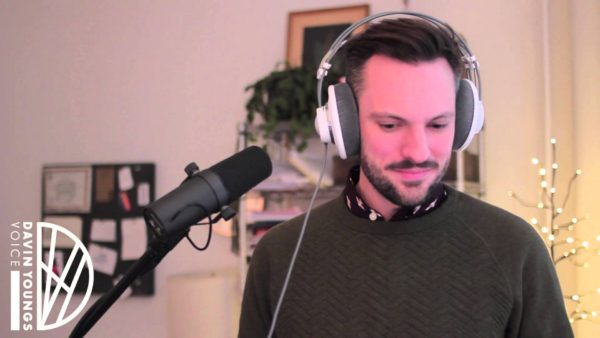
VOXUS: Your voice is not the most important thing about the song. Your voice is the conduit for the story.
One thing I always say in the private singing space when I work with individuals is your voice is not the most important thing about the song. Your voice is the conduit for the story. It’s the tool to tell the story. As soon as you start to think that your voice is the most important thing, it shuts down communicating the story. If that is not a metaphor for a company, I don’t know what is. If you think about the people standing up doing the pitches, the presentations and the board meetings, where if you realize that you’re the conduit of the story but the story is the more important thing, that’s an interesting space.
It is and what comes forth for me in this conversation is I think about the summit or about any of our roles within the company that we hold. We are about being a catalyst for something. We create situations, we create spaces, but it’s not necessarily just us. It comes through us. There are relationships, there are things that are brought into that, but then what happens from there is way beyond any individual. It is where the collective comes into being. That’s why we believe the community piece is important, is anytime you try to do anything in isolation, there’s no power there. It’s when we all bring our voices in and you think of music and harmonizing and creating together. It’s open ended.
Once a story is shared, it’s up to the community to continue to share it.
The other thing you see a lot of people mistaking is that they can control the story, that the story is theirs. Once a story is shared, it’s up to the community to continue to share it and that will change in shape differently. That’s what happens in the improvised setting always, is that I offer the beginning of the story and then you keep it going. This is true in musical improvisation, even though we don’t say it out loud, but the whole yes end-piece. I take whatever information you’ve given me and I run with it. I accept it as good and I accept as true. I continue to take it and I move with it and I offer it to someone else. Again, we’re drawing from our experiences. We’re not pulling out of nowhere. We’re drawing from our ethnic background, from our community, our faith, our sexuality. There are all these parts of us that are bringing us into a collective experience and all of those parts are important and we don’t have singular control.
You just said the magic word with control, because we so want to believe we’re in control. Whenever the summit comes together and there are the speakers and everyone that’s coming in and anyone who knows me, I’m usually in a state of complete disarray at the beginning of the day because I’m trying to control everything that happens and you can’t. You have to let it go. You surrender and say, “Everyone is here to do their part,” and the rest is going to happen and unfold in whatever way that you have to improvise it.
That also reminds me of what you said earlier about developing a muscle. I do talk about this in this talk I do, usually about improvisation is a tool to be developed. We know this from functional MRIs that people have learned how to quiet parts of their brains, the parts of them that tell them they’re not good enough. We specifically know this from rappers and jazz musicians who use improvisation routinely, that there are areas of their brains that are quiet that allow them to not think about themselves so much. That’s something that you practice many hours. I host a gathering called Circle Singing and we meet twice a month here in Chicago. This is a gathering not for corporate folks, this is a gathering for anyone who wants to come and use their voice in this setting.
I was saying that anyone can show up and have a good time and I believe that. You can have any skill or any experience, anyone can show up and have a good time. The people that come routinely have a better time because you start to feel empowered, you start to feel bold, and you start to feel like, “I get the hang of this.” I’ve watched that happen over hosting this a couple of years. That I have some people that come routinely and they start to get good at this. It’s not something that they magically have the ability to do, they practice it. It goes back into the idea, “How do I practice being uncomfortable? How do I practice sharing? How do I practice vulnerability? How do I practice disruption?”
When we had our conversation with Kelly, he talked about improvisation being the yoga for your social skills, and we got into a conversation about practice. The things that look so easy are actually very practiced. Since we become what we do, every day the small choices that we’re making and the investments that we’re making are all the seeds of what will be created in business and in our lives. This idea of choosing and opting into a practice that’s very empowering changes your life.
The other thing that I’d like to explore with you along those lines is the vulnerability, the disruption, taking a chance and a risk. Kelly talked a little bit about the beauty of failure and some of the greatest things coming from failing first. In our world, we are trying to move as fast as we can in terms of version 1.0, 2.0, 3.0. We see this across the corporate landscape. Talk a little bit about the idea of failure and how that’s gotten you to where you are now and how that fits in with what you’re doing and the importance of it.
Every sound is something that can be built upon.
I rarely think of it in that terminology, but I fail all the time every day. I don’t think about it like that and it makes me think that that’s the key piece. With this work on improvisation and singing, every sound is a useful sound. We believe that every sound is something that can be built upon. It doesn’t matter if your experience of it is that it’s bad or wrong, we potentially can use it. Some sounds point toward music better than others. The goal of what we do is to create music, and that’s what always happens because I’m there and it lead us into that space. Regardless, we can take stuff that is seemingly bad or wrong and do something with it.
Sometimes that means exploring it deeper. Sometimes it means like, “Is this bad or wrong? Is this useful?” Sometimes you find out that’s not useful. That silly sound that you made was not useful in terms of building a piece of music. This goes back into a learned practice of living in that space where our first instinct called personal standpoint is to judge what we’ve done. I always encourage people to try to think critically rather than judgmentally. The question asking is way more important than the good or bad, “Is this good or bad?” You can ask a question about it or you can say what it is. When we’re thinking critically, we’re asking questions. “Is this useful? Is there something more you should know about this? Is there something else here?” If I immediately say, “This is bad or good,” then that’s the whole story. Talk about telling stories, stories shut down.
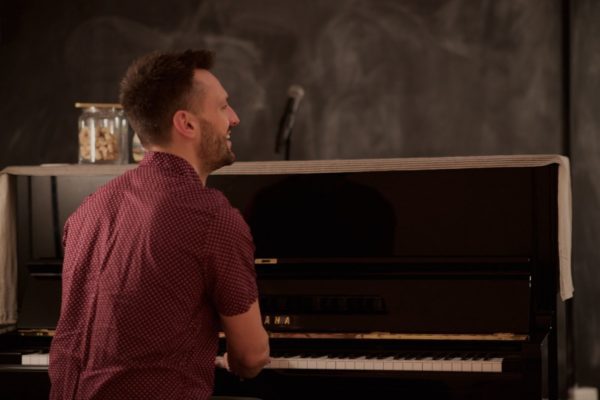
VOXUS: Try to think critically rather than judgmentally.
What I love about what you decide with the insight that came was that you don’t think about failure as failure, you think of it as an opportunity to find a different place. It’s almost like what you said was a roadmap to innovation and success. It’s about any idea that comes not to judge but to be critical of it. Ask for its usefulness, explore it, and find the other side. That was very powerful.
That’s what artists are forced to do if they are going to be artists. That’s the piece that business miss sometimes. Experiment, explore, notice, just to be noticed. If you want to make music, if you want to make art, if you want to move, you have to be able to notice what is going on. In a lot of the private voice work I do, it’s about calling people’s attention to their body because we’ve become disembodied. When you’re singing, it’s your body making the sound. What do you notice physically about that? Again, that’s a muscle to build, but what comes out of it will always surprise you.
It’s slowing down though. I feel that in business, the pace is faster. Everyone I work with, it seems like there’s this general feeling of overwhelm. I would imagine for anyone listening to this conversation that they would share a feeling of overwhelm and they listen to things to go help me figure out what are the secrets to escape this huge onslaught of information and tasks and need. Your idea of noticing is important because we’ve got to rise above all the tyranny of the busy and the tasks that are happening. Kelly shared with us that you have to linger mindfully within the mistake so that you’ve got a level of curiosity. Be curious. Don’t be quick to shut down or be self-critical of what you’ve done because so much can happen from the mistake, so much can be born from the mistake. Every sound is a useful sound. It’s just fantastic.
There might be some irony in hearing improvisers talking about lingering. When you think about improvisation, you don’t think about lingering, but the practice of improvisation is learning to linger. We think about it as learning to respond. Does this make sense what I’m saying?
Absolutely.
That’s what people don’t see very clearly behind the curtain. It’s like when I worked on this, I mastered it, I’m learning to sit back and hang out. I’m not moving faster. It might appear to you like I’m moving quickly. My ability to create a song on the spot is not my ability to move fast, it’s my ability to be still, notice in present, and trust. That trusting piece, that’s so huge for improvisers. Any artist, creative, or leader, to trust that your team, to trust that people around you will support you specifically with the improvised singing work that we do, it’s always collective. Rarely is there an individual voice. It’s always collective. The idea is that at any point you can drop out, but there’s a whole team of people that are there to support you. That to me is a beautiful picture of what happens in the improvised setting.
This is such a great conversation because the wisdom of that is everywhere. Even within sales training, we do sales training within the company and they talk about how do we work with our customers. A lot of salespeople are formulating their answer before the customer’s even done. I’m sure everyone’s experienced that. Part of the conversation is listen, acknowledge, and be silent for a while because the customer might be thinking about something they want to share. Don’t just constantly talk. We have to be trained to do that because we’re just like, “We want to talk.” It’s everywhere. Whether you’re an artist, whether you’re in business, you have to have enough time to go slow and to listen.
It makes me think of the thing I said earlier, with what you’re saying about sales. Your voice is not the most important thing about the story. If every salesperson knew that, you are not the reason this will sell.
You’re a conduit in your ability to tell that story.
Success is contingent upon that, but you are not the most important part of it. If you can get rid of that ego piece and connect with the person you’re trying to connect with through this story that you’re trying to tell, you make a lot of money.
It’s powerful. We piloted the summit eight years ago. When the idea was on the table, there were discussions like, “Will key competitors be in the same room together? Will that be awkward? How will that go?” What has been beautiful for me to watch over time is that when people come together, they’re coming together from a very human place of, “We all got pressure,” especially as CMO’s, it’s such a huge pressure job. They’re in there to try to understand the solutions and figure out new ways. All of a sudden it is this collective experience and it’s been amazing to watch that grow.
That’s a picture of contemporary business. That’s the way it is now. We didn’t use to be interconnected. Now you have no choice but to be connected with your competitors. You should know that your customers connect with your competitors, so you might as well. Especially young people, they’re not brand loyal in the same way they are operating with a different network. The leaders within the community owe it to themselves to be a part of that bigger picture.
Where do you go from here? You’ve been on this journey and you’ve developed this amazing experience that is still expanding as you go. Where does it go? Where do you see the future for you?
Into the unknown. What I’m sorting through for myself is that I am a singer, first and foremost. Part of the joy of this work for me is the singing part. The other joy is bringing other people into that experience. It’s not specific to companies, nonprofits or churches, it’s the human experience. I’m exploring how I can more fully bring people into embodied experiences of themselves using their voice because I know that people walk away changed from those types of experiences. I aspire to continue to find myself in front of more and more different types of people and different types of groups.
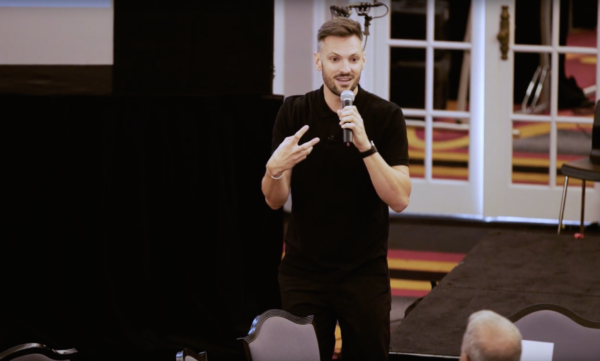
VOXUS: There are so many communities around the world that could use those moments of being reminded of their humanity.
My dad called me recently after watching a 60 Minutes special and he’s like, “Have you ever thought about going to prisons?” I was like, “No, but I would totally go to a prison.” There are so many communities around the world that could use those moments of being reminded of their humanity and being reminded of what it is to be in a space of joy, happiness, and togetherness. I don’t know a quicker way in than this work, specifically improvised singing. I don’t think I’m overstating this. I don’t know a faster way in to bring people into this experience than that. I’m onto something that’s going to be gigantic. It’s going to be huge and it’s going to be totally unexpected in what way.
What’s your favorite song?
The one I’m going to make up.
Davin, thank you. One of the reasons I was drawn to you when I first heard your voice on the podcast was I heard your passion come through. It’s so evident. The lesson as we think about how we are taking our conversations and having them be pearls of wisdom, the lessons for those here in this, no matter what you are doing, no matter what your personal calling is and your personal mission is, you’ve got to take it with both hands and see how you can make a change. That’s what you’re doing and it’s very infectious. We want to say thank you. I’m honored that you’ve been to the summit and I know that our collaboration is certainly not done. Thank you so much.
Thank you. This is a great conversation.
Thank you. Anytime I can be the bad sound, because no sound is bad, that’s useful. Thank you very much. This is fantastic.
Important Links:
- Davin Youngs
- The RobCast – Davin Youngs interview
- VOXUS
- Omega Institute
- Circlesongs
- Bobby McFerrin
- Voicestra
- Circle Singing
About Davin Youngs
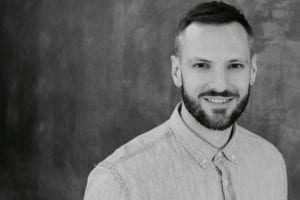 Davin Youngs is a singer, teacher and facilitator based in Chicago, IL. He has spent thousands of hours with individuals and groups, helping them explore their voice as an instrument for change. As a SomaticVoicework ™ teacher, Davin has worked with internationally acclaimed singers in hip hop, punk and musical theater. As a singer and facilitator, he has studied improvisational singing with Rhiannon and Bobby McFerrin, which he uses to lead companies and organizations like Google, JLL, Coca-Cola and Chicago Public Schools into spontaneous, music-making using only their voices. In 2017 he was featured on New York Times Best Selling Author, Rob Bell’s podcast about VOXUS, where he unpacks what it means to take a roomful of corporate executives into an improvised singing experience.
Davin Youngs is a singer, teacher and facilitator based in Chicago, IL. He has spent thousands of hours with individuals and groups, helping them explore their voice as an instrument for change. As a SomaticVoicework ™ teacher, Davin has worked with internationally acclaimed singers in hip hop, punk and musical theater. As a singer and facilitator, he has studied improvisational singing with Rhiannon and Bobby McFerrin, which he uses to lead companies and organizations like Google, JLL, Coca-Cola and Chicago Public Schools into spontaneous, music-making using only their voices. In 2017 he was featured on New York Times Best Selling Author, Rob Bell’s podcast about VOXUS, where he unpacks what it means to take a roomful of corporate executives into an improvised singing experience.
Ultimately Davin is an advocate for the voice and believes singing is one of the most efficient paths to sharing in our collective human experience.
Love the show? Subscribe, rate, review, and share!
Join The Coca-Cola CMO Leadership Summit Podcast community today:
Davin Youngs, VOXUS, VOXUS: Working With The Human Voice with Davin Youngs, Working With The Human Voice with Davin Youngs